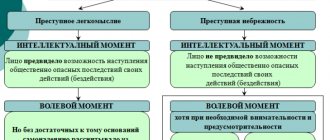Updated July 21, 2022 621 Author: Dmitry Petrov
Hello, dear readers of the KtoNaNovenkogo.ru blog.
Most people periodically experience guilt, but do not realize the reasons for its occurrence or confuse it with other states of mind.
This feeling, like a heavy stone on your chest, does not allow you to relax and engage in everyday activities.
Moral discomfort can help a person change for the better, and sometimes it can destroy life. In this article you will learn how psychologists and lawyers relate to the phenomenon of guilt.
What is wine? Definition of concept and content
Russian criminal law defines the concept of guilt as the mental attitude of the subject to the objective signs that are part of the crime.
Guilt includes:
- Awareness by an individual subject of the socially dangerous consequences of his actions (inaction).
- The presence or absence of intent to commit them.
- Desire or reluctance, anticipation or lack thereof, of the consequences of these actions.
The meaning of guilt
The meaning of the concept of form of guilt is as follows:
- This concept serves as the basis of a subjective type for bringing to responsibility, being a mandatory feature of the offense.
- It allows you to distinguish between unlawful actions that have similar objective signs.
- It helps to establish the degree and nature of the danger of the act and its subject for society, influencing the qualification of the offense, which ultimately leads to the correct determination of the sanctions applied.
The principle of guilt in criminal law
This principle is legally enshrined in the criminal law - Article 5 of the Criminal Code of the Russian Federation. The principle states that there is no objective imputation in Russian law - criminal liability for innocent causing of harm is not allowed.
The subject is subject to liability for those actions and dangerous consequences for which his guilt has been established.
This concept is close to the concept of the principle of presumption of innocence. The accused is considered innocent until his guilt is proven and established by a court verdict. The principle is enshrined in the Constitution of the Russian Federation and the Criminal Procedure Code.
Moscow
Saint Petersburg
Free consultation
Moscow
Saint Petersburg
Intention as a form of guilt. Types of intent. Intellectual and volitional moments of intent
An intentional crime in accordance with Part 1 of Art. 25 of the Criminal Code of the Russian Federation recognizes an act committed with direct or indirect intent. Types of intent: 1. Direct intent (dolus directus) - a person was aware of the social danger of his actions (inaction), foresaw the possibility or inevitability of socially dangerous consequences and desired their occurrence (Part 2 of Article 25 of the Criminal Code RF). The content of the direct intent of the material elements of crimes: - 1st - intellectual moment - the person was aware of the social danger of his act; - 2nd - intellectual moment - the person foresaw the possibility or inevitability of socially dangerous consequences; - volitional moment - the person desired the occurrence of socially dangerous consequences. The content of direct intent of formal crimes: - 1st - intellectual moment - the person was aware of the social danger of his act; - a volitional moment - and wanted to commit a conscious act. Formal crimes cannot be committed with indirect intent, since the subject, realizing that the crime is expressed only in the commission of an act that does not entail certain consequences, cannot show an indifferent attitude towards these consequences. 2. Indirect intent (dolus indirectus, dolus eventualis) - the person was aware of the social danger of his actions (inaction), foresaw the possibility of socially dangerous consequences, did not want, but consciously allowed these consequences or was indifferent to them (Part 3 of Article 25 of the Criminal Code RF). Content of indirect intent: - 1st - intellectual moment - the person was aware of the social danger of his act; - 2nd - intellectual moment - the person foresaw the possibility of socially dangerous consequences; - volitional moment - the person did not want, but consciously allowed these consequences or was indifferent to them. Depending on the moment of occurrence (formation) of intent, they are distinguished: - premeditated intent (dolus praemeditatus) - presupposes the existence of a person’s intention to commit a crime long before the moment of committing the crime; -suddenly arising intent (dolus repentinus) - involves cases where the perpetrator states his intention to commit a crime immediately upon its occurrence; -affected intent - the subject of the crime, as a result of the unlawful actions of the victim, is in a state of strong emotional excitement (affect). Affect is extremely strong, rapidly flowing, short-term emotional excitement of an explosive nature, which finds release in action with weakened volitional control or its complete absence.
In the theory of criminal law, it is customary to divide intent also according to the degree of certainty into: - specific intent (dolus determinatus), when the perpetrator foresees well-defined socially dangerous consequences. Concretized intent is divided into: - simple concretized intent, that is, the perpetrator foresees that as a result of his act, one very definite socially dangerous consequence will occur; - alternative specific intent (dolus alternatuvus) - the perpetrator foresees that as a result of his act, one very specific socially dangerous consequence will occur. Crimes committed with alternative intent are classified depending on the actual consequences; - unspecified intent (dolus indeterminatus), which is characterized by the fact that the perpetrator has not an individually defined, but a generalized idea of the objective properties of the act. Although the subject foresees the onset of socially dangerous consequences, he does not imagine exactly what severity the socially dangerous consequences caused by him will be (with unspecified intent, the act is assessed according to the consequences that occur). 20. Crime committed through negligence, types of negligence. 21. A crime committed out of frivolity. Intellectual and strong-willed moments. Distinction from indirect intent. 22. Crime committed through negligence. Objective and subjective criteria of negligence. Innocent harm. A careless crime, according to Part 1 of Art. 26 of the Criminal Code of the Russian Federation, an act committed through frivolity or negligence is recognized. Types of negligence:
Frivolity (luxuria) - a person foresaw the possibility of socially dangerous consequences of his actions (inaction), but without sufficient grounds for this he arrogantly counted on preventing these consequences (Part 2 of Article 26 of the Criminal Code of the Russian Federation). Content of frivolity: intellectual moment - the person foresaw the possibility of socially dangerous consequences of his act; moment of will - but without sufficient grounds for this, she arrogantly counted on preventing these consequences. In its intellectual element, frivolity is similar to indirect intent. The difference is that with CG the perpetrator foresees the real possibility of the occurrence of socially dangerous consequences, and with frivolity this possibility is foreseen as abstract: the person foresees that socially dangerous consequences may occur, but believes that in this particular case they will not occur, i.e. . frivolously approaches the assessment of those conditions that, in his opinion, should prevent the onset of a criminal result. The main difference between L and KU is the content of the volitional element. If with CU the perpetrator consciously allows the occurrence of generally dangerous consequences (he has a neutral or positive attitude towards them), then with L the subject strives to allow them to occur (but he fails to do so). Negligentia (negligentia) - a person did not foresee the possibility of socially dangerous consequences of his actions (inaction), although with the necessary care and forethought he should and could have foreseen these consequences (Part 3 of Article 26 of the Criminal Code of the Russian Federation). Content of negligence: - intellectual moment - the person did not foresee the possibility of socially dangerous consequences of his act; - a volitional moment - although with the necessary care and forethought it should (objective criterion) and could (subjective criterion) foresee these consequences. The objective criterion of criminal negligence is that the ability to foresee the socially dangerous nature of one’s actions and consequences is recognized in a person when these actions and consequences in given conditions could have been foreseen by a person who has the same level of concern for everyone about the interests of others, about state and public interests. The subjective criterion of criminal negligence is that the ability to foresee the socially dangerous nature of an action and consequences is recognized in a person, taking into account his individual abilities, level of development, qualifications, age, etc. The subjective criterion makes it possible to take into account all the individual abilities of the citizen who caused by his action (inaction) ) harmful consequences. When determining criminal negligence, an objective criterion is used to determine how the citizen should have behaved in this case. The solution to the question of whether the perpetrator in this particular case could have foreseen the socially dangerous nature of his actions and harmful consequences is possible only on the basis of a subjective criterion. Types of negligence must be distinguished from an incident (case), that is, innocent causing of harm (Article 28 of the Criminal Code of the Russian Federation). Under this condition, criminal liability is excluded: “Casus a NULLO prestantur”[1]. The Criminal Code of the Russian Federation has found legislative recognition of two types of incidents. 1. According to Part 1 of Art. 28 of the Criminal Code of the Russian Federation, an act is recognized as committed innocently if the person who committed it did not realize and, due to the circumstances of the case, could not realize the social danger of his actions (inaction) or did not foresee the possibility of socially dangerous consequences and, due to the circumstances of the case, should not have (objective criterion) or could not (subjective criterion) have foreseen them. Accidental infliction of socially dangerous consequences is qualitatively different from a crime committed through negligence. The inability to foresee harmful consequences can be caused by objective circumstances, the specific situation in which a socially dangerous act was committed, or subjective characteristics of a person: lack of knowledge, qualifications, weak mental abilities, illness, etc. Innocent harm is characterized by the absence of either both criteria of criminal negligence (objective and subjective), or one of them. 2. The second type of innocent harm should be distinguished from frivolity. In accordance with Part 2 of Art. 28 of the Criminal Code of the Russian Federation, an act is recognized as committed innocently even if the person who committed it, although he foresaw the possibility of socially dangerous consequences of his actions (inaction), could not prevent these consequences due to the inconsistency of his psychophysiological qualities with the requirements of extreme conditions or neuropsychic overload . The effect of this norm, comments R.I. Mikheev, does not apply to cases of socially dangerous consequences arising through the fault of the person himself. For example, if a person hides his psychophysiological deficiencies that prevent him from performing a given type of activity or profession, fraudulently occupying a corresponding position that requires special knowledge, skills and training, as well as in the case of voluntarily putting himself in a certain state due to the use of alcohol, narcotic, psychotropic or other potent substances[2]. That. accidental, without intent or negligence, causing socially dangerous consequences means the absence of guilt in a person’s behavior, therefore in such cases a person is not subject to criminal liability for lack of corpus delicti. This provision is based on the principle of subjective imputation enshrined in Art. 5 of the Criminal Code of the Russian Federation.
What forms (types) of guilt are provided for in the Criminal Code of the Russian Federation?
A separate chapter of the Criminal Code of the Russian Federation - 5ya - is devoted to forms of guilt. We examined the types of guilty actions in more detail earlier, giving detailed examples.
In short, guilt manifests itself in the form of intent and negligence . Intention, in turn, is divided into direct and indirect, and negligence into frivolity and negligence.
Types of intent
According to the conditions for the occurrence of intent, it is divided as follows:
- Premeditated. It is expressed in the fact that the offender, having decided to commit an offense, drew up a plan and worked on it for some time.
- Arose suddenly. It is expressed in the fact that the guilty person commits an offense immediately after the idea arises, or after a very short period of time, without thinking through the details and details.
- Affective. It is expressed in the fact that a person commits an illegal act in a state of strong emotional experience or excitement, in which the brain does not have time to fully comprehend the act being committed.
Crimes with two forms of guilt
Along with the forms of guilt, the fifth chapter also gives the meaning of crimes with two forms of guilt.
These are crimes where the main element, which can be both formal and material in its structure, is intentional, and individual qualifying characteristics can be committed through negligence, and the consequences are more serious than with the main one.
In general, such crimes are considered intentional and can only be qualified .
Signs of intent
In the concept of the form of guilt, two signs of intentional acts are distinguished: intellectual and volitional.
An intellectual sign of actions with direct or indirect intent is awareness of the danger of an illegal act for society and anticipation of the possibility (inevitability) of negative consequences. The peculiarity of this sign is that in both cases the person understands what he is doing and what it can lead to.
A volitional sign of actions with direct intent is the desire of the offender for consequences dangerous to society to occur. Indirectly, a person does not want them to occur, but allows for such a possibility, or is indifferent to the possibility of their occurrence.
Distinguishing guilt by degree of foresight
If a person could not foresee the occurrence of negative consequences of his own actions or inaction, then his actions cannot be criminally punishable. It is precisely such actions that constitute innocent harm.
As an example, we can cite a situation where poison was added to food to bait insects, and one of the relatives, not knowing about it, ate this product.
This type of action differs from criminal negligence precisely in the inability to foresee the consequences.
Intention and its types
In 90% of judicial practice, cases of intentional commission of crimes are considered.
Intention is present when the accused foresaw the consequences of his actions.
There are two types of intent:
- Straight. In this case, the purpose and expected consequences of criminal actions coincide. Accordingly, the crime itself is committed to achieve this result.
- Indirect. The consequences that arose as a result of the offense were not planned by the offender and arose as a concomitant of his goal.
These two types significantly influence the qualification of the offense and can change the types of punishment.
Have a question for a lawyer? Ask now, call and get a free consultation from leading lawyers in your city. We will answer your questions quickly and try to help with your specific case.
Telephone in Moscow and the Moscow region: +7
Phone in St. Petersburg and Leningrad region: +7
Free hotline throughout Russia: 8 (800) 301-39-20
Signs of intent
The main signs of intentional commission of a crime are:
- Awareness of the consequences. The criminal clearly understands what results his actions will lead to.
- Goal setting. Achieving these results is his goal.
In general, it can be noted that the main characteristic feature is the desire for the corresponding consequences of illegal actions to occur.









